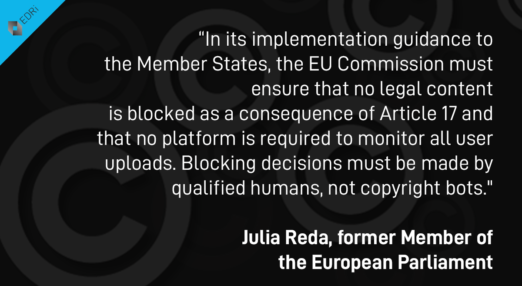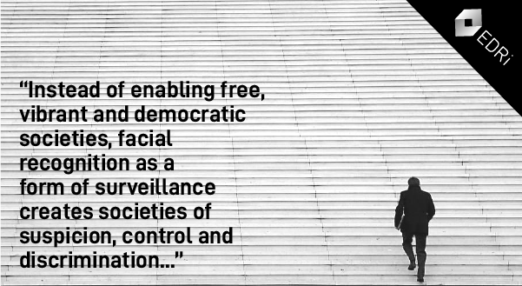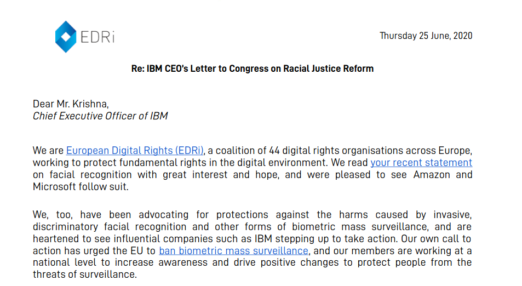Surveillance and data retention
Filter resources
-

Is surveilling children really protecting them? Our concerns on the interim CSAM regulation
On 27 July, the European Commission published a Communication on an EU strategy for a more effective fight against child sexual abuse material (CSAM). The Communication indicated several worrying measures that could have devastating effects for your privacy online. The first of these measures is out now.
Read more
-

EDRi with 25 organisations urge Parliament to protect journalists, doctors, lawyers, social services
Together with a coalition of 25 organisations and companies, EDRi urges members of the European Parliament’s Civil Liberties, Justice and Home Affairs Committee (LIBE) to include strong procedural safeguards in the so called “E-Evidence Regulation”.
Read more
-

Technology has codified structural racism – will the EU tackle racist tech?
The EU is preparing its ‘Action Plan’ to address structural racism in Europe. With digital high on the EU’s legislative agenda, it’s time we tackle racism perpetuated by technology, writes Sarah Chander.
Read more
-

Upload filters? Still no, thanks
Together with thousands of protestors, EDRi has fought against mandatory upload filters in the Copyright Directive. Despite the Directive having been adopted, including the infamous Article 13 (now 17) that could lead to upload filters, the Directive allows for some flexibility to prevent the worst impacts on our freedom of expression.
Read more
-

Keep private communications private
On 27 July, the European Commission published a Communication on a EU strategy for a more effective fight against child sexual abuse material (CSAM). The Communication indicates that messaging services (WhatsApp, Facebook Messenger…) may see their privacy protections undermined under new legislation that will be proposed this week.
Read more
-

Down with (discriminating) systems
Amidst a particularly hectic time for digital rights policy in Europe, there remains a large elephant in the room.
Read more
-

Digital Services Act: what we learned about tackling the power of digital platforms
A year into EDRi’s policy and advocacy efforts to improve the DSA, we take stock of our efforts in mapping challenges and successes in enabling positive change.
Read more
-

First Analysis of the Austrian Anti-Hate Speech Law (NetDG/KoPlG)
On September 3rd the Austrian government released a legislative package to tackle online hate speech. Besides a comprehensive justice reform, the package also contains a bill that creates new obligations for online platforms to remove illegal user-generated content. This article offers a first analysis of the so called Kommunikationsplattformen-Gesetz (KoPl-G) and the many similarities it has to the German Netzwerkdurchsetzungsgesetz (NetzDG).
Read more
-

SHARE Foundation presents #hiljadekamera : A documentary on biometric mass surveillance
SHARE Foundation has recently released a short documentary on the controversial use of the mass surveillance system in Belgrade, Serbia. Various digital experts and activists took part in the documentary, including the national Data Protection Authority in Serbia and EDRi's own Policy and Campaigns Officer, Ella Jakubowska.
Read more
-

IBM’s facial recognition: the solution cannot be left to companies
On 8 June 2020, IBM’s CEO announced to the US Congress that – on the grounds of “justice and racial equity” – the company would “sunset” its “general purpose” facial recognition technologies. EDRi has addressed the company through a letter, but IBM's response suggests the organisation is motivated by public relations, instead of fundamental rights.
Read more
-

Open Letter: EDRi calls on IBM to clarify stance on facial recognition
On 25 June, EDRi sent an open letter to the CEO of IBM in response to their 8 June statement on racial equality and facial recognition in the US.
Read more
-

COVID-Tech: COVID-19 opens the way for the use of police drones in Greece
In EDRi’s series on COVID-19, COVIDTech, we explore the critical principles for protecting fundamental rights while curtailing the spread of the virus, as outlined in the EDRi network’s statement on the pandemic.
Read more
